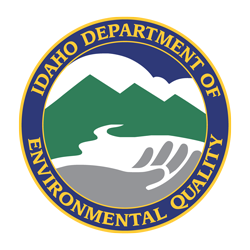Permitting authority for sewage sludge and biosolids transferred to DEQ from EPA on July 1, 2021. Sewage sludge is the solid, semisolid, or liquid untreated residue created during the wastewater treatment process. When treated and processed, sludge becomes biosolids, which are the stabilized residuals that settle from the water during the treatment process. Biosolids may be disposed of or beneficially used. Sludge and biosolids use and disposal are regulated under state and federal rules.
Regulation of Sludge and Biosolids
Industrial and municipal sewage sludge is subject to federal, state, and local regulations. The following regulations may apply to municipal or non-municipal facilities that generate sludge, derive a material from sludge or biosolids, land-apply biosolids, or own or operate a site where biosolids may be applied:
- Standards for the Use or Disposal of Sewage Sludge
- Environmental Protection and Health Act of 1972 (Idaho Code § 39-1)
- Idaho Pollutant Discharge Elimination System Rules (IDAPA 58.01.25)
- Wastewater Rules (IDAPA 58.01.16) and Water Quality Standards (IDAPA 58.01.02)
- Recycled Water Rules (IDAPA 58.01.17)
Municipal
Municipal sewage sludge is the solid, semisolid, or liquid untreated residuals created during the wastewater treatment process. Municipal sewage sludge may be disposed or further treated to biosolids. Biosolids are stabilized nutrient rich materials safe for beneficial use for soil augmentation. Biosolids may be beneficially used or disposed through agricultural or non-agricultural land applications.
Beneficial Reuse – DEQ and the EPA consider biosolids a beneficial resource because they contain nutrients and organic matter. The beneficial reuse of biosolids through land application is encouraged. Biosolids that are to be beneficially used must meet federal and state requirements.
When treated to 40 CFR 503 standards, biosolids can be used for soil augmentation to improve and maintain productive soils and stimulate plant growth. Before sewage sludge is treated to biosolids or used, DEQ must approve a biosolids management plan. This plan reviews how the biosolids were treated to meet standards for pathogens, vectors, and pollutants, and outlines the use and management that meet the requirements of IDAPA 58.01.650. Biosolids treatment is designed to kill pathogens, stabilize organic matter, reduce odors, and minimize vector attraction so that it is safe for its designated use. There are only two federally regulated categories of biosolids that may be beneficially used, Class A or Class B and these designations are based on treatment methods and pathogen levels. The different classes have specified treatment requirements for pollutants, pathogens, and vector attraction reduction, as well as general requirements and management practices.
Disposal – Sewage sludge or biosolids may be disposed of by various means such as landfilling, incineration, or other forms of surface disposal. Before sewage sludge is disposed, DEQ must approve a sludge disposal plan.
Requirements – All facilities that generate or prepare municipal sewage sludge must comply with federal, state and local rules. This includes all POTWs and non POTWs that generate sewage sludge.
Although 40 CFR Part 503 is a self-implementing rule, to comply with 40 CFR 503 federal regulations certain treatment works specified by Part 503 are required to submit an annual report on biosolids treatment and management practices to their permitting authority by February 19th of each year. For sites that are discharging POTWs, these requirements are incorporated into each IPDES permit. For sites that do not operate under an IPDES discharge permit, EPA and state reporting and approved state plans are still required.
For all facilities that want to land apply biosolids, an approved biosolids management plan is required before land application of biosolids.* (A biosolids management plan is equivalent to a sludge disposal plan, as referenced in IDAPA 58.01.16.650.) As prescribed in a memorandum of understanding between DEQ and Idaho’s public health districts, responsibility for approving the plan may rest with either DEQ or a public health district.
* Exception: Under a rule interpretation issued by DEQ, the plan submission requirement has been waived for land application of bagged biosolids that meet Class A Exceptional Quality requirements. The intent is to consider bagged biosolids brought in to the state, that is created from an approved Class A EQ biosolids site in another state.
To comply with state wastewater rules, disposal or use plans must be approved by DEQ. Set up a meeting with your regional DEQ office to discuss the details and reference the Guidance for Land Application of Municipal Biosolids.
Industrial or Non-Municipal Sludge
Industrial on non-municipal sludge is the solid, semisolid, or liquid untreated residuals created during the non-municipal wastewater treatment process.
Beneficial Reuse – The beneficial reuse of industrial sludge through the land application is encouraged when the material can be assessed to show that it is safe and has nutrients or organic matter that would be beneficial to soil or plants.
Disposal – All facilities that generate industrial or nonmunicipal sludge must comply with federal, state and local rules. Industrial sludge utilization or disposal plans requirements may be in your permit and are required even if they are not outlined within the permit. Generators of non-municipal sludge are advised to consult with DEQ prior to developing a sludge management plan to outline the needs of the plan.
Staff Contact
Municipal CWA Programs Supervisor

